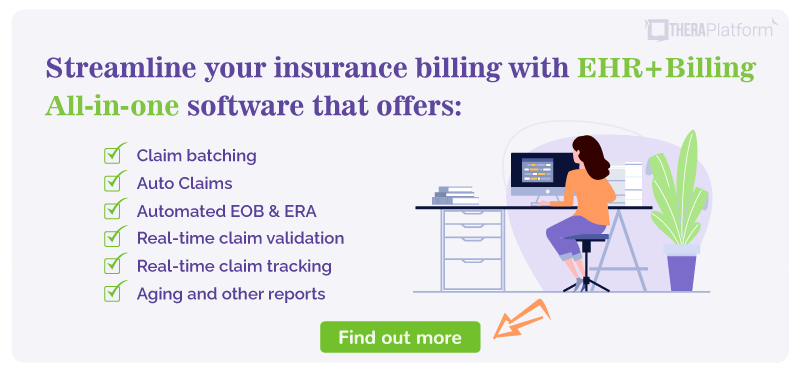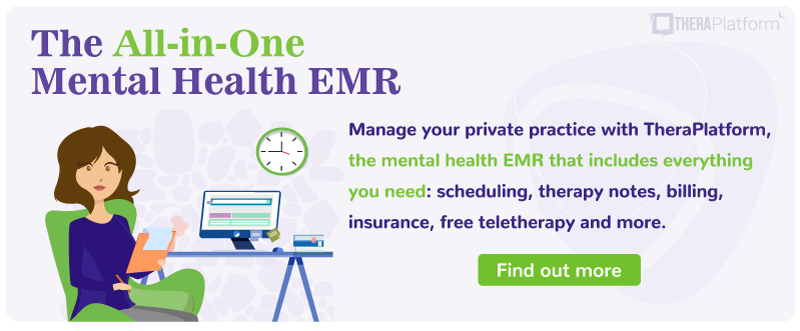Taxonomy codes for mental health therapists

Taxonomy codes are familiar to therapists who do their own billing. If you don’t do your own billing, you might be surprised to find that taxonomy codes are a vital piece of information if you want to be reimbursed by a third-party payer. They are linked to your National Provider Identifier (NPI), which is usually required if you work with clients who want to use insurance. Let’s discuss what you need to know about taxonomy codes if you are a mental health therapist.
→ Click here to enroll in our free on-demand Insurance Billing for Therapists video course [Enroll Now]
What are taxonomy codes?
Taxonomy codes are a 10-digit alphanumeric identifier used to describe the scope of your practice. For example, if you identify yourself as a clinical child psychologist, you would have the following taxonomy code: 103TC2200X. Current taxonomy codes can be found on the National Uniform Claim Committee (NUCC) website. Taxonomy codes are used for all health professions, not just mental health.

Taxonomy codes are linked to the process of obtaining a National Provider Identifier (NPI). If you are a Health Insurance Portability and Accountability Act (HIPAA) covered entity or if you are a therapist who bills Medicare for your services, you are required to have a NPI.
Originally, The Centers for Medicare and Medicaid Services (CMS) included the taxonomy codes in the NPI process to help differentiate among health professionals, but insurance companies now use them to govern reimbursement.
Taxonomy codes have three separate levels:
- Level I is the broadest provider type. It is a general grouping of healthcare providers. For example, “Behavioral Health and Social Service Providers, “Allopathic & Osteopathic Physicians”, and “Dental Providers”.
- Level II is a more specific delineation of the scope of practice and is a subset of the level I provider type. Counselors, psychologists, and social workers, for instance, are level II designations under “Behavioral Health and Social Service Providers”.
- Level III represents a specific area of specialization. Counselors, for example, can be identified as addictions counselors, mental health counselors, or school counselors, among others. Psychologists currently have over 20 level III designations from which to choose.
Relevant points about taxonomy codes for mental health providers:
- An individual provider can choose multiple taxonomy codes to cover the scope of their practice, but only one will be considered the “primary” code.
- While it is a strict requirement of Medicare reimbursement, most other insurance carriers will also ask for your NPI and taxonomy codes.
- If you are the owner of a private practice, you will need separate taxonomy codes for each provider and the practice itself.
Watch this video to learn about taxonomy codes
→ Start My Free Trial
→ Enroll in Your Free, On-Demand Insurance Billing for Therapists Course
→ Start My Free Trial
What are therapist concerns with the taxonomy code?
- 1) Taxonomy codes were not created by mental health professionals. As such, there is some question as to whether the codes accurately represent the fields of psychology, counseling, and social work. For example, there are only two level III categories for social workers: clinical and school. We know that clinical social workers can have many specializations but they are not represented in the taxonomy codes. This begs the question: what do you put as your taxonomy number if your specialty is not accurately represented?
- 2a) Insurance companies are famous for finding reasons to deny payments (to be fair, some are better than others). However, if a third-party payer deems that your taxonomy code does not represent the services you are providing, they can choose to limit or deny payment. For example, say you are a psychologist treating someone with a substance abuse disorder but you did not list addictions as one of your specialties. The insurance company may question why a psychologist who does not specialize in addictions is providing treatment in this area.
- 2b) It is also possible that a client’s insurance doesn’t cover a specific specialization for which you signed up. For example, say you chose pastoral counseling as your primary taxonomy but their insurance doesn’t cover that speciality. You could be denied payment for your services. Even if you can eventually convince them that the payment is warranted, you will take up your precious time in the appeal process.
- 3) If a clinician selects numerous specialty taxonomy codes, third-party payers may question the therapist’s expertise in all these different areas. In other words, how many specialties can one person have?
→ Download My Free Insurance Billing Guide
Do I need an NPI and taxonomy code?
If you work in an agency or an institution, you have to have a NPI and taxonomy code. This is because larger institutions are HIPAA-covered entities that accept insurance. If you work in private practice, however, and don’t take insurance, this is a murkier area.
Technically, a therapist who does not take insurance may not be considered a covered entity under HIPAA. As such, they may not need to follow HIPAA and have an NPI number and the accompanying taxonomy codes. However, if a client wants to submit for out-of-network benefits, their insurance company may ask for the provider’s NPI number and taxonomy codes.
And, even if you are not part of an institution that follows HIPAA requirements, every clinician must abide by client confidentiality and privacy guidelines. So, while it may not be strictly necessary, it is a good idea for all therapists to get an NPI. It is not a difficult process and it may help you avoid unnecessary headaches at a later date.
Start 30-day Free Trial and explore TheraPlatform. HIPAA Compliant Video and Practice Management Software for Therapists.
Tips for choosing mental health taxonomy codes
There are no rules for choosing taxonomy codes. However, the following tips will help you avoid potential problems:
- Stay current on your codes. Taxonomy codes are updated twice a year. Make sure your codes are still relevant and reflect your scope of practice.
- Have a balanced approach to choosing your taxonomy codes. You could choose taxonomy codes that represent every area in which you practice. In fact, you could choose numerous level III codes and not put down a more general code. This has the advantage of covering all possible specialties but may be viewed as stretching yourself too thin. Conversely, you could just choose a general level II code. But that may not be viewed as specific enough if you are treating someone in a specialized area. Therefore, It is recommended to choose a level II code as your primary code and then include two or three main specialization codes. That way, you cover your bases but you don’t look like you are trying to be an expert in everything.
- If you start a new specialization (that covers more than a few clients) you should consider adding that level III code.
- If you own a practice, you might want to choose a broader taxonomy that represents most of the therapists in the practice. For example, if you have therapists that are psychologists and counselors, it is appropriate to choose the level II codes “counselor” and “psychologist” for the practice taxonomy.
Watch this video to learn common insurance billing struggles and solutions
→ Start My Free Trial
→ Start My Free Trial
How EHR and practice management software can save mental health providers time on insurance billing
EHR with integrated billing software and a clearing house, such as TheraPlatform, offers mental health clinicians significant advantages in creating an efficient insurance billing process. The key is minimizing the amount of time dedicated to developing, sending, and tracking medical claims through features such as automation and batching.
What are automation and batching?
- Automation refers to setting up software to perform tasks with limited human interaction.
- Batching or performing administrative tasks in blocks of time at once allows you to perform a task from a single entry point with less clicking.
Which billing and medical claim tasks can be automated and batched through billing software?
- Invoices: Create multiple invoices for multiple clients with a click or two of a button or set up auto-invoice creation, and the software will automatically create invoices for you at the preferred time. You can even have the system automatically send invoices to your clients.
- Credit card processing: Charge multiple clients with a click of a button or set up auto credit card billing, and the billing software will automatically charge the card (easier than swiping!)
- Email payment reminders: Never manually send another reminder email for payment again, or skip this altogether by enabling auto credit card charges.
- Automated claim creation and submission: Batch multiple claims with one button click or turn auto claim creation and submission on.
- Live claim validation: The system reviews each claim to catch any human errors before submission, saving you time and reducing rejected claims.
- Automated payment posting: Streamline posting procedures for paid medical claims with ERA. When insurance offers ERA, all their payments will post automatically on TheraPlatform's EHR.
- Tracking: Track payment and profits, including aging invoices, overdue invoices, transactions, billed services, service providers
Utilizing billing software integrated with an EHR and practice management software can make storing and sharing billing and insurance easy and save mental health clinicians time when it comes to insurance billing for therapists.
Resources
Theraplatform is an all-in-one EHR, practice management and teletherapy solution that allows you to focus more on patient care. With a 30-day free trial, you have the opportunity to experience Theraplatform for yourself with no credit card required. Cancel anytime. They also support different industries including mental and behavioral health therapists in group practices and solo practices.

More resources
- Therapy resources and worksheets
- Therapy private practice courses
- Ultimate teletherapy ebook
- The Ultimate Insurance Billing Guide for Therapists
- The Ultimate Guide to Starting a Private Therapy Practice
- Mental health credentialing
- Insurance billing 101
- Practice management tools
- Behavioral Health tools



